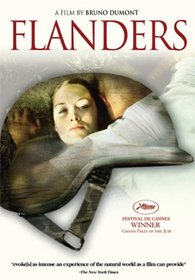| Actors: Adélaïde Leroux, Samuel Boidin, Henri Cretel, Jean-Marie Bruveart, David Poulain Director: Bruno Dumont Creators: Yves Cape, Bruno Dumont, Guy Lecorne, Abdelaziz Ben Mlouka, Jean Bréhat, Muriel Merlin, Rachid Bouchareb Genres: Indie & Art House, Drama, Military & War Sub-Genres: Indie & Art House, Drama, Military & War Studio: KOCH LORBER FILMS Format: DVD - Color,Widescreen - Subtitled DVD Release Date: 11/06/2007 Original Release Date: 01/01/2006 Theatrical Release Date: 01/01/2006 Release Year: 2007 Run Time: 1hr 31min Screens: Color,Widescreen Number of Discs: 1 SwapaDVD Credits: 1 Total Copies: 0 Members Wishing: 2 MPAA Rating: Unrated Languages: French Subtitles: English |
Search - Flanders on DVD
  | Flanders Actors: Adélaïde Leroux, Samuel Boidin, Henri Cretel, Jean-Marie Bruveart, David Poulain Director: Bruno Dumont Genres: Indie & Art House, Drama, Military & War UR 2007 1hr 31min André Demester leaves his farm in northern France to become a soldier in a far off land. On his last night of freedom he witnesses Barbe, his childhood friend and secret love, sleeping with another man. A twist of fat... more » |
Larger Image |
Movie DetailsSimilar Movies
Similarly Requested DVDs
|
Movie ReviewsFlanders- A beautiful Film George in Houston | Spring, Texas United States | 12/15/2007 (4 out of 5 stars) "I loved Flanders. The director delivers a raw, stripped down film that initially seems hard to engage. But the humanity and searing emotions of the main characters become vivid and real far beyond what you initially expect or will see elsewhere. It' a portrait of country life, the difficulity of understanding and expressing emotion and the horrors of war. Beautifully shot. It's a movie you'll either love or hate. I doubt many will fall in the middle. Lovers of film should try it." Bruno Dumont's Love Story and Fable Tsuyoshi | Kyoto, Japan | 07/28/2007 (3 out of 5 stars) ""Flanders" may be a brilliant, philosophical cinematic art, or just a pretentious piece of rubbish. The film won Grand Prize of the Jury at Cannes in 2006, but the audiences including you and me may not share the opinions of the jury. French director Bruno Dumont's fourth film has a clearer storyline than his previous works, but still it is not a film made for multiplex, with traditional grammars of cinema. You don't hear any sound track music and the characters are all played by non-professionals.
"Flanders" revolves around a set of youths, especially farmer Demester (Samuel Boidin) and Barbe (Adelaide Leroux), living in Flanders, Northern France. Demester is attracted to Barbe, who makes love to him, but their feelings (if any) are not openly expressed with dialogues. (In fact, the film does not use many words, and could have been shot without them.) And Barbe, as it is shown later, does not refuse to sleep with another man. Characters, all laconic, act as if driven by primitive emotions hidden deep inside, which come to forefront as Demester and his friends leave their peaceful countryside and join the army. These ordinary youths are sent to an unnamed battlefield where some of the French soldiers commit atrocious deeds, gradually losing their humanity. Here Bruno Dumont presents violence and brutality without explaining the motives or backgrounds of the characters' behaviors. You don't even know why those soldiers are there. You only know that they are no longer what they were, and the film follows them in a cold, matter-of-fact way. While Demester is away, sensitive Barbe experiences nervous breakdown. What makes her feel so depressed is left to our imagination, but judging from some of her lines, she may be able to "see" or "connect" in some mysterious way. But nothing is explained clearly, which either impress or frustrate you. It is obvious "Flanders" is a love story, but as I said before, Dumont refuses to use orthodox film storytelling, and his style sometimes results in long scenes of, say, Demester walking in the field. You may call it realism, but this also might cause sleep-inducing effects. In Dumont's vision sex is detached and you are never allowed to "relate" to the characters. Some call it a fable; some dismiss as art-house nonsense. I for one was attracted to its visuals, but I prefer good, old way of storytelling." |















